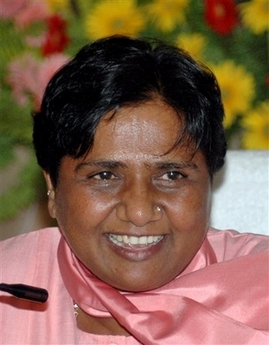Low-caste politician wins India vote
(AP)Updated: 2007-05-12 08:54 LUCKNOW, India - India's most powerful low-caste politician swept into power Friday in the country's largest state, dealing a political blow to the scion of the powerful Gandhi clan.
Mayawati, a fiery 51-year-old woman who goes by one name, was set to become the chief minister of Uttar Pradesh, a vast, poor state that encompasses more than 180 million people and often sets the political agenda for the rest of the country.
"I thank people of all castes and communities who supported my party to achieve this overwhelming victory," Mayawati, a dalit, or "untouchable," at the bottom of India's complex social ladder, said at a news conference.
 Bahujan Samaj Party (BSP) leader Mayawati addresses a press conference after her party's victory in the Uttar Pradesh state elections, in Lucknow, India, Friday, May 11, 2007. [AP] |
The election will likely slow the rise of Rahul Gandhi ¡ª the son, grandson and great-grandson of Indian prime ministers. By Friday afternoon, Gandhi's Congress party had gained no additional seats in the state assembly despite his relentless campaigning. Gandhi holds a seat in the Indian Parliament, representing a rural district in Uttar Pradesh.
The election was the first serious political test of Gandhi, 36, who is a rising power in the Congress party and ¡ª despite his youth and inexperience ¡ª already is mentioned as a possible future prime minister. Though the Congress party is not a major force in the state, Gandhi's campaigning was expected to help boost its political power.
Mayawati forged a powerful coalition that brought together low-caste and Brahmin voters and candidates to force out Mulayam Singh Yadav, the state's outgoing chief minister whose own support was rooted among middle-caste farmers.
Mayawati, who has been chief minister of the state twice before, lost power in 2003 amid controversy over her government's approval of a $40 million-dollar tourism complex near the Taj Mahal.
The Uttar Pradesh elections are unlikely to have an immediate impact on Prime Minister Manmohan Singh's Congress-led government in New Delhi, though the state often plays a key role in shaping national political alliances. The next national elections are due in 2009.
|
||
|
||
|
|